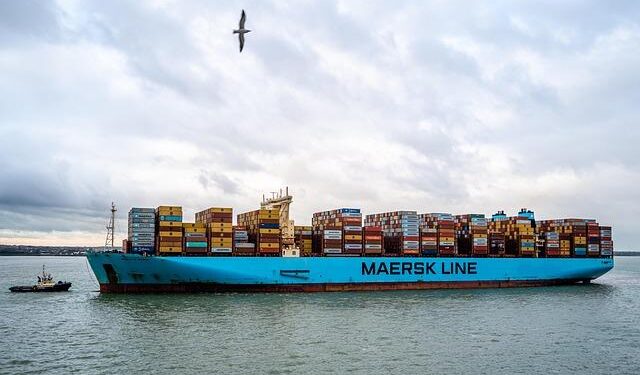Maersk Diverts US-Flagged Vessels from China as New Port Fee Takes Effect: Kuehne+Nagel
In a strategic move responding to the implementation of a new port fee in China, shipping giant Maersk has begun diverting its US-flagged vessels away from the country’s ports. This decision marks a significant shift in logistics and maritime operations, according to Kuehne+Nagel, one of the world’s leading freight forwarders. As global supply chains continue to grapple with the repercussions of changing regulations and rising operational costs, the diversion could have broad implications for shipping routes and trade dynamics between the United States and Asia. Industry experts are now closely monitoring how this development may affect cargo delivery times, shipping rates, and overall trade flows in an already tumultuous maritime environment.
Maersk Responds to New Port Fee by Reassessing US-Flagged Vessel Routes
In light of the recent implementation of a new port fee impacting maritime operations, Maersk is proactively reassessing its routing strategies for US-flagged vessels. This shift comes as the logistics giant aims to optimize its operations and mitigate the cost implications of the new charges. The company has indicated a strategic pivot away from traditional routes connecting the United States with China, as they seek alternatives that could enhance efficiency and cost-effectiveness. Maersk’s decision underscores the potential for significant changes in the maritime landscape as companies respond to evolving regulatory environments.
Among the options being considered are adjustments to shipping lanes and freight handling processes. Key factors guiding Maersk’s reassessment include:
- Cost efficiency: Analyzing the financial impact of the new fee on overall operations.
- Transit times: Evaluating the potential for quicker routes to maintain service levels.
- Trade dynamics: Monitoring shifts in demand and supply chains influenced by the current economic climate.
Operational teams are currently evaluating several alternative routes, which may facilitate smoother exports and imports, reducing dependence on the now more expensive port connections. This agile response reflects Maersk’s commitment to adapting its practices in an ever-changing global marketplace.
Implications for Global Shipping Dynamics and Supply Chain Stability
The recent decision by Maersk to redirect US-flagged vessels away from China due to the implementation of a new port fee marks a significant shift in global shipping dynamics. As international shipping routes are re-evaluated, companies will be compelled to assess their logistics strategies to adapt to these changes. This move may result in a ripple effect throughout the supply chain, impacting various sectors reliant on timely deliveries, especially those heavily integrated with the Asian market. With increasing operational costs and changing trade routes, businesses must remain agile and proactive in their supply chain planning.
Moreover, the strategic pivot by Maersk could lead to heightened tensions in international trade relations, particularly between the U.S. and China. As freight costs rise and alternative shipping routes become more prevalent, companies may face challenges such as:
- Increased Shipping Times: Rerouting may result in longer transit periods.
- Higher Freight Costs: New fees and longer routes could inflate transportation expenses.
- Supply Chain Disruptions: Stakeholders will need to adapt rapidly to maintain stability.
In light of these factors, an adaptive approach will be essential for companies to mitigate risks associated with supply chain stability. Engaging in robust forecasting and diversified sourcing strategies may become critical as businesses navigate through this evolving landscape.
Strategic Recommendations for Shipping Companies Navigating Port Fee Changes
As shipping companies face increasing pressure from evolving port fees, it is essential to adopt proactive strategies that mitigate the financial impacts while maintaining operational efficiency. One viable approach is to diversify shipping routes, allowing companies to circumvent areas where fees are significantly elevated. By identifying alternate ports that offer competitive pricing, companies can enhance their supply chain agility and reduce overhead costs. Additionally, investing in technology to optimize route planning and logistics can help streamline operations amidst rising expenses.
Furthermore, forming strategic alliances and partnerships with other stakeholders can provide valuable leverage against fluctuating port fees. By collaborating with local port authorities and industry groups, shipping companies can advocate for more favorable fee structures and enhance overall port operations. Emphasizing cost-sharing initiatives and collective bargaining can also result in more favorable terms and access to resources that improve service delivery, ultimately ensuring a competitive edge in the market. Regularly reviewing financial models and adjusting pricing strategies in response to changing port dynamics is also crucial for long-term viability.
Concluding Remarks
In conclusion, the decision by Maersk to divert US-flagged vessels from China in response to the newly implemented port fee underscores the ongoing complexities within global maritime logistics. As shipping costs continue to rise and supply chain challenges persist, the move highlights not only the strategic adjustments of major shipping companies but also the broader implications for international trade dynamics. Kuehne+Nagel’s insights into this development reflect the adaptation necessary for stakeholders in the shipping industry, as they navigate a landscape increasingly shaped by regulatory changes and economic pressures. As the situation unfolds, industry players will be closely monitoring the impact of these measures on shipping routes and trade volumes, further emphasizing the critical interplay between policy and commerce in today’s global economy.














